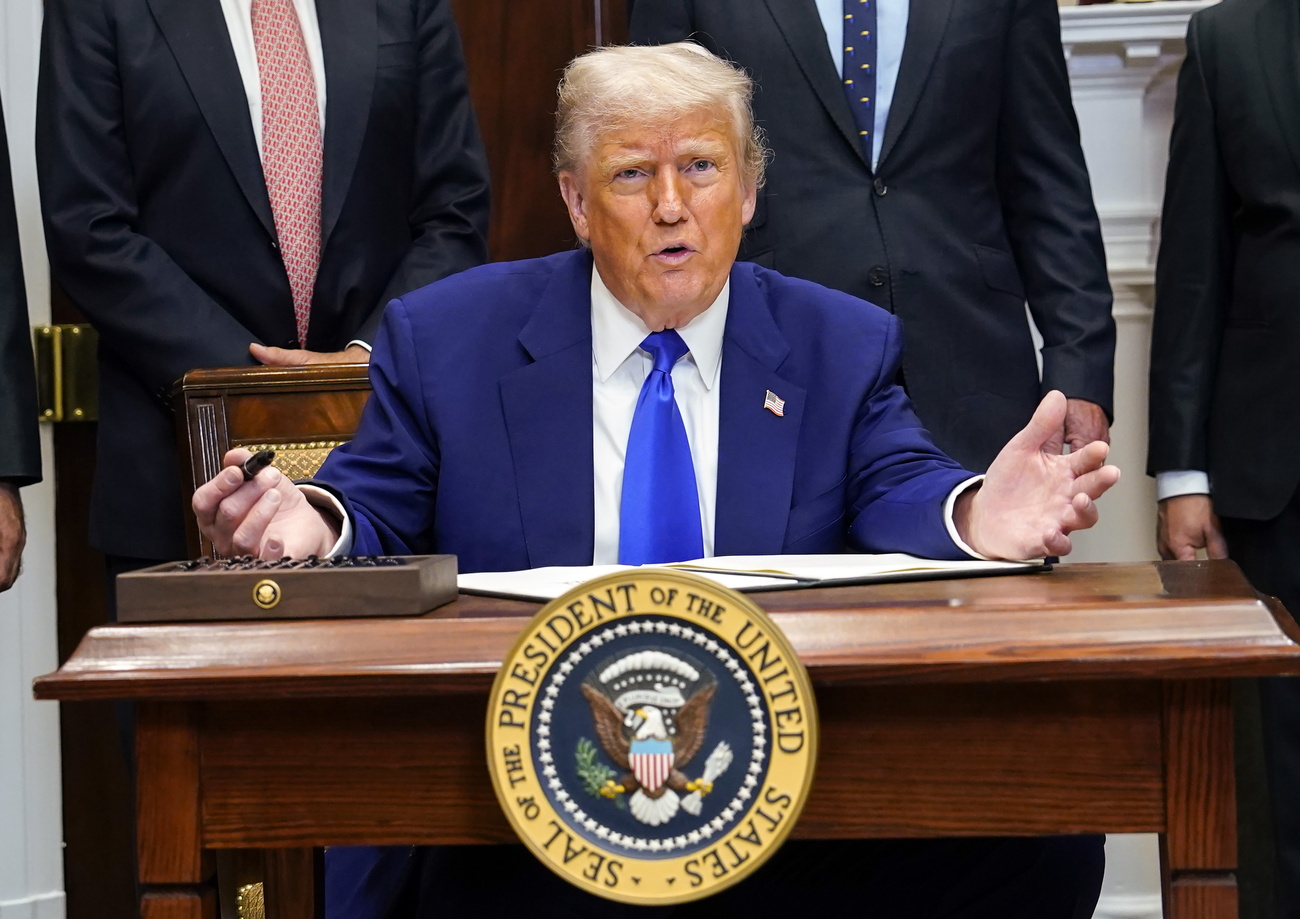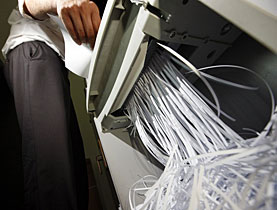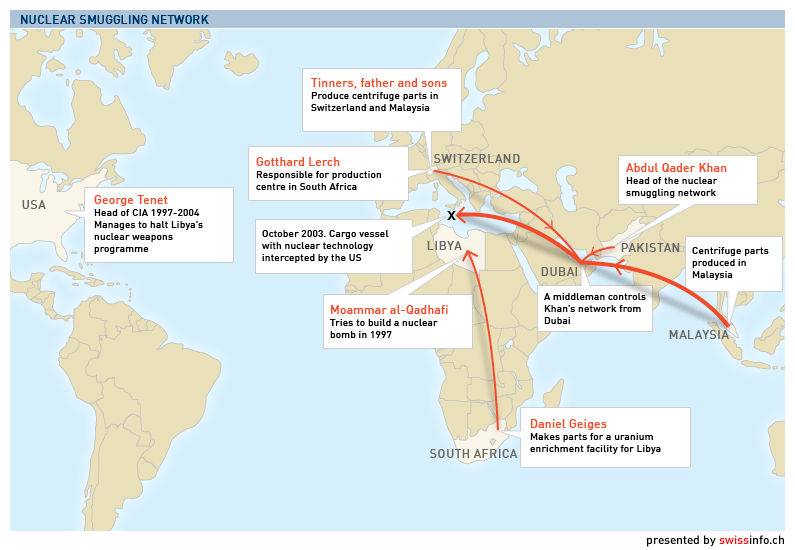
Conflict over nuclear files intensifies

Following a police raid on a federal building in connection with a nuclear-smuggling case, tensions between Switzerland's judiciary and executive have escalated.
At the centre of the showdown is a dossier that contains roughly 100 pages of documents so sensitive that the government wants them destroyed. The original files were indeed shredded secretly in November 2007 but copies surfaced last December.
On Thursday investigators and cantonal police stormed into federal security offices in Bern and seized a safe containing the keys to a filing cabinet that holds the disputed documents.
Sealing the safe was supposed to ensure that the documents would remain physically intact, but it was not clear whether the government still had access to them.
The Justice Ministry announced on Friday that it would go ahead with the destruction of the most sensitive ones. The investigators have since said that they would not take any further action, to avoid further escalation of the situation.
Andreas Kley, a law professor at Zurich University, rejects the government’s argument that the exceptional nature of the case demands exceptional measures.
“Referring to an emergency clause in the constitution which enables it to take necessary measures in extraordinary cases, the government wants to intervene in a criminal case and destroy some files,” he told swissinfo.ch on Friday.
“To do this, the government must be able to show that it is essential for the public interest that matters are resolved. This has not been shown in the current case. The government decided to destroy the files without explaining why.”
The documents at the heart of the heated debate between lawyers, parliamentarians and the government relate to the Tinner affair. The most sensitive of all are supposed to contain plans for a nuclear bomb.
Urs, Marco and Friedrich Tinner, engineers with ties to a centrifuge business, have been the subject of allegations that they contributed to a nuclear smuggling ring run by Abdul Qadeer Khan, the father of Pakistan’s nuclear programme. The Tinners maintain their innocence.
It is believed that the documents include information about the involvement of the CIA in the Khan network. In addition, former Justice Minister Christoph Blocher is alleged to have promised his United States counterpart during a visit to Washington in 2007 that the files would be destroyed.
“This situation is absolutely unprecedented,” Kley said. “There has never been such a conflict between the government and the federal criminal authorities.”
Delicate issue
Investigators say the dossier with the copied files is crucial to the smuggling case and have demanded it be handed over in full. So far the government has refused, saying the documents are a matter of national security and that the ministers’ decision to destroy them leaves no legal room for an appeal.
On Thursday the government said it considered the order to confiscate the safe and key to be invalid.
“The next step is particularly delicate,” said Kley, explaining that the main issue now was sorting out who had the authority to handle the files.
“Depending on who has this power, the files will either be destroyed, if it’s the government, or preserved, if it’s the investigating authorities. No one knows at the moment; we’ve got to wait. We’ll probably know in a few days who has the real power over the files and their subsequent fate.”
In August the Senate is scheduled to discuss the issue, amid calls for a parliamentary investigation.
“Power-mad politicians”
The police raid has been the main story in Swiss newspapers, which failed to find a common line.
In the Neue Zürcher Zeitung (NZZ) Alain Griffel, a law professor at Zurich University, described the move by the court as “high-handed”.
Griffel admittes that neither the constitution nor the law helped resolve the issue, but believes the government should have the trump card when the interests of the state are at stake.
The NZZ also quoted Georg Müller, a retired professor of law, as saying it was a serious conflict about the separation of powers between judiciary and executive and the question of who should have the upper hand.
Bern’s Der Bund and the Zurich-based Tages-Anzeiger were more critical of their politicians.
The government was obsessed with power, said the Tages-Anzeiger in its editorial. “There are now serious doubts about whether the government is in touch with reality. The seven power-mad politicians appear to believe they rule the citizens of this country. But in reality they serve them.”
The Berner Zeitung said it was high time to answer many questions. “Switzerland can’t afford such a major dispute between the judiciary and the executive. The country benefits, like no other, from social, political and legal stability – particularly during a global financial crisis.”
For its part, the Neue Luzerner Zeitung takes confort in that “the separation of powers works well in Switzerland.”
Thomas Stephens and Urs Geiser, swissinfo.ch
In 2004 the International Atomic Energy Agency supplied the Swiss authorities with a list of two companies and 15 individuals suspected of dealing in nuclear material with Iran and Libya.
Swiss engineer Urs Tinner, who is suspected of helping Libya obtain nuclear weapons technology, was arrested in Germany in October 2004. He was extradited to Switzerland in 2005.
His father Friedrich and brother Marco were also arrested by the Swiss authorities on suspicion of breaking the law on war materials by illegally exporting nuclear bomb-making equipment to Libya.
According to a documentary called The Spy from the Rhine Valley, the Tinner family was friends with Abdul Qadeer Khan, the founder of Pakistan’s nuclear programme and head of a black market network that supplied Iran and Libya with weapons parts.
Khan, who called the Tinners “an honest Swiss family”, stayed at their house.
The Tinners are engineers who deal in centrifuges. Authorities suspected them of contributing to Khan’s network, which Khan has denied. Khan’s system was disrupted in 2003 after the centrifuges bound for Libya were seized.
Urs Tinner says he sabotaged equipment that he knew was bound for secret uranium enrichment programmes so it would malfunction on the first use. He doesn’t say which country had ordered the parts.
There has been speculation that the Tinners were working for the CIA and that Washington put pressure on Bern to hand over the disputed documents. Urs Tinner has said he was in fact spying for the Americans, which could be a crime. The disputed documents may contain information that could clarify the Tinners’ roles in the affair.


In compliance with the JTI standards
More: SWI swissinfo.ch certified by the Journalism Trust Initiative






























You can find an overview of ongoing debates with our journalists here . Please join us!
If you want to start a conversation about a topic raised in this article or want to report factual errors, email us at english@swissinfo.ch.